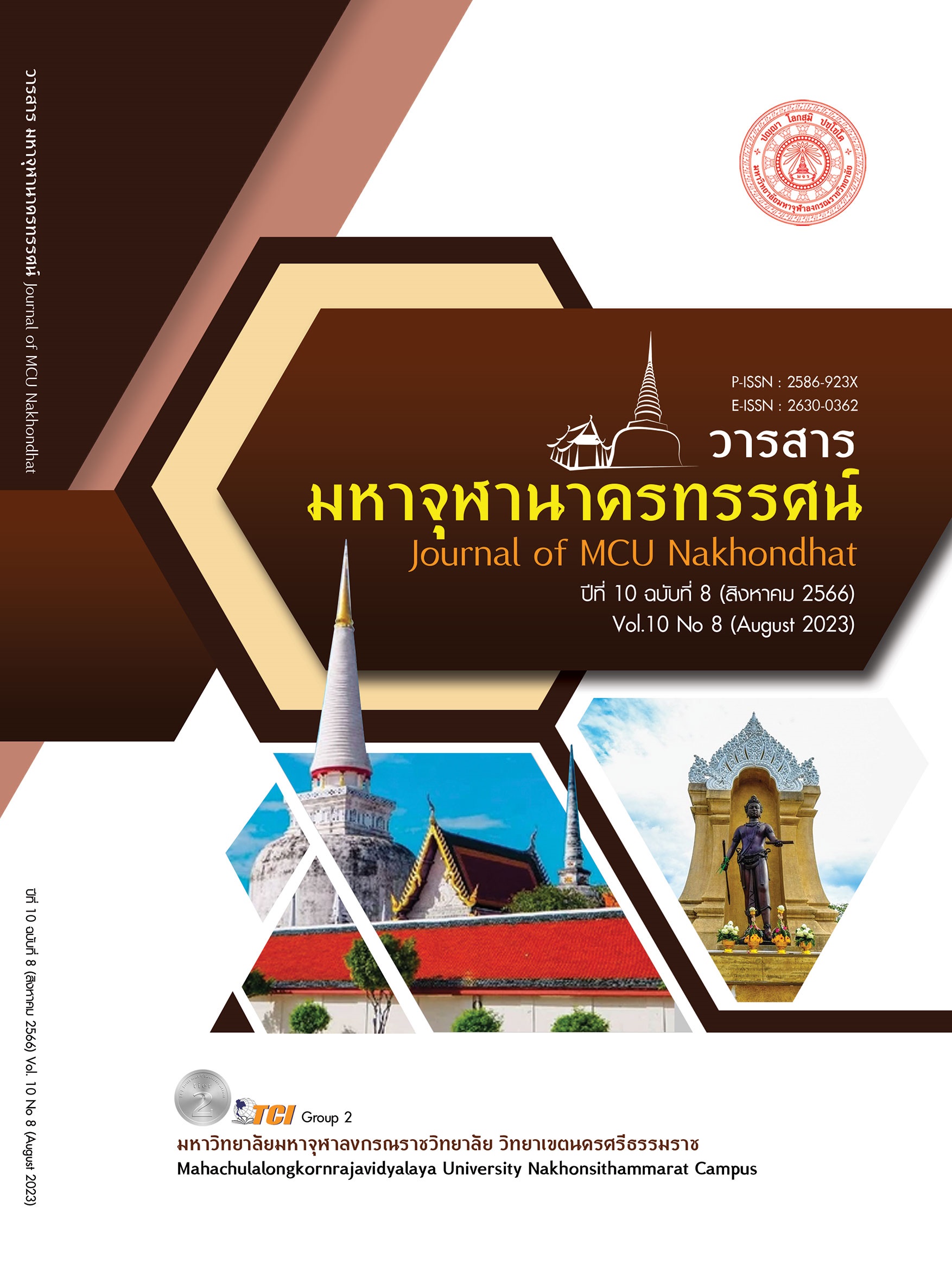THE DEVELOPMENT OF LEARNING ACHIEVEMENT BY INQUIRY-BASED LEARNING (5E) WITH SCIENTIFIC BOARD GAME FOR GRADE 5 STUDENTS
Main Article Content
Abstract
This article has the objective for compare the learning achievements between before and after the learning management using a search for Inquiry-based Learning (5E) with Scientific Board Game and between after learning for Inquiry-based Learning (5E) with Scientific Board Game with 80% criterion. The study population consisted of 19 Grade 5 students at Wat-Inthanin School and the researcher conducted research in the first semester of the academic year 2023. The tools used in the research were a learning management plan of Inquiry-based Learning (5E) with Scientific Board Game, Scientific Board Game and the learning achievement form. The researcher has collected data from one experimental group and this was a double-measurement study. The test was performed before the learning management of Inquiry-based Learning (5E) with Scientific Board Game by the learning arrangement. Then the learning management by the researcher was taught by using the learning management plan with the process of Inquiry-based Learning (5E) with Scientific Board Game and after the learning arrangement, the researcher conducted a post-test by the learning arrangement. Take the test scores before studying and after studying that have been obtained. They were analyzed by statistical methods to compare learning achievement between before learning and after learning and during after school compared to the criteria of 80 percent. The researcher took the test scores before and after the learning management for mean and standard deviation. The results were the learning achievement after being managed, They showed that After the learning management the process of Inquiry-based Learning (5E) with Scientific Board Game, the learning achievement after the learning management of the population had an average score ( = 24.11, S.D. + 2.51) higher than before the learning management ( = 13.58, S.D. + 3.53) and the learning achievement the learning management had score ( = 24.11) was higher than the 80% criterion.
Article Details

This work is licensed under a Creative Commons Attribution-NonCommercial-NoDerivatives 4.0 International License.
References
กระทรวงศึกษาธิการ. (2551). ตัวชี้วัดและสาระการเรียนรู้แกนกลางการศึกษาขั้นพื้นฐานพุทธศักราช2551. กรุงเทพมหานคร: โรงพิมพ์ชุมชนสหกรณ์การเกษตรแห่งประเทศไทย จำกัด.
ณัฐวดี บุญรัตน์. (2562). ศึกษาการพัฒนาผลสัมฤทธิ์ทางการเรียนและทักษะกระบวนการทางวิทยาศาสตร์ของนักเรียนชั้นประถมศึกษาปีที่ 2 โดยใช้กิจกรรมแบบสืบเสาะหาความรู้ (5E)ร่วมกับชุดกิจกรรม. ใน วิทยานิพนธ์ครุศาสตรมหาบัณฑิต สาขาวิชาวิทยาศาสตรศึกษา. มหาวิทยาลัยราชภัฏมหาสารคาม.
เตือนใจ เฉลิมกิจ. (2555). เกมภาษาอังกฤษสำหรับเด็ก. กรุงเทพมหานคร: หน้าต่างสู่โลกกว้าง.
ประสาท เนื่องเฉลิม. (2558). การเรียนรู้วิทยาศาสตร์ในศตวรรษที่ 21. กรุงเทพมหานคร: จุฬาลงกรณ์มหาวิทยาลัย.
ภพ เลาห์ไพบูลย์. (2542). แนวการสอนวิทยาศาสตร์. เชียงใหม่: อินเตอร์เนชั่นแนลคอมเมอร์เซียล.
วรรณณิภา พรหมหาราช. (2564). ศึกษาการจัดการเรียนรู้ด้วยกระบวนการสืบเสาะหาความรู้ 5 ขั้นร่วมกับบอร์ดเกมเรื่องพันธะเคมีเพื่อพัฒนาทักษะการแก้ปัญหาของนักเรียนมัธยมศึกษาปีที่ 4. ใน วิทยานิพนธ์ปริญญาครุศาสตร์มหาบัณฑิต สาขาวิชาวิทยาศาสตรศึกษา. มหาวิทยาลัยราชภัฏมหาสารคาม.
วิจารณ์ พานิช. (2555). วิถีสร้างการเรียนรู้เพื่อศิษย์ ในศตวรรษที่ 21. กรุงเทพมหานคร: มูลนิธิสดศรี-สฤษดิ์วงศ์ โรงพิมพ์ บริษัท ตถาตา พับลิเคชั่น จำกัด.
วิจารณ์ พานิช. (2556). การสร้างการเรียนรู้สู่ศตวรรษที่ 21. กรุงเทพมหานคร: เจริญการพิมพ์.
สถาบันส่งเสริมการสอนวิทยาศาสตร์และเทคโนโลยี. (2557). ครูวิทยาศาสตร์มืออาชีพ แนวทางสู่การเรียน. กรุงเทพมหานคร: สถาบันส่งเสริมการสอนวิทยาศาสตร์และเทคโนโลยี.
สุวิธิดา จรุงเกียรติกุลม. (2561). ทักษะการเรียนรู้ในศตวรรษที่ 21. กรุงเทพมหานคร: จุฬาลงกรณ์มหาวิทยาลัย.
อรัญ ซุยกระเดื่อง. (2557). สถิติขั้นสูงสำหรับงานวิจัย. มหาสารคาม: มหาวิทยาลัยราชภัฏมหาสารคาม.


